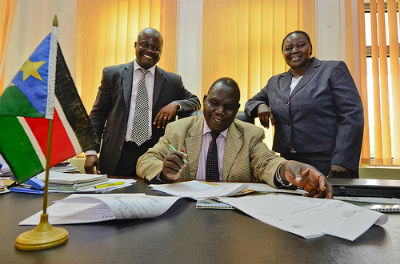![“*Pictured (l-r): Mathew Abang, PABRA coordinator; Jaden Emilio Tongun, Undersecretary of South Sudan’s Ministry of Agriculture, Forestry, Irrigation, Cooperatives and Rural Development; Anna Itwari Felix, South Sudan’s national bean research coordinator” [PABRA]](http://www.southsudannewsagency.com/wp-content/uploads/2013/07/aaaa-PABRA.jpg) South Sudan has joined the Pan-Africa Bean Research Alliance (PABRA)
South Sudan has joined the Pan-Africa Bean Research Alliance (PABRA)
July 18, 2013 (SSNA) — The world’s newest country, which celebrated its second birthday this month, officially became the 30th member of the CIAT-coordinated network following a signing at the federal Ministry of Agriculture in the capital Juba, recently.
Beans are a major staple in South Sudan, but two decades of war and the internal displacement of millions of farmers means many of its native varieties have been lost or produce poor yields. The country currently imports up to 95 per cent of its beans from neighbouring Uganda, but high transport and transaction costs mean bean prices in Juba are significantly higher than in Kampala.
Membership of PABRA means South Sudan now has free and easy access to numerous improved bean varieties and expert technical advice to help launch its own national bean research programme and boost domestic production, which should help reduce its reliance on imports and bring down prices for consumers. The new agreement follows several months of South Sudan holding official observer status on the steering committee of ECABREN – PABRA’s eastern and central Africa regional network – to help it find out more about the role of PABRA and the benefits of full membership.
“The excitement of PABRA members about the prospect of South Sudan joining was amazing,” said PABRA coordinator Mathew Abang, who represented CIAT at the signing of the new agreement by Jaden Emilio Tongun, Undersecretary of South Sudan’s Ministry of Agriculture, Forestry, Irrigation, Cooperatives and Rural Development. “Official membership of PABRA is an important milestone as it clears the way for PABRA to work with the Government of South Sudan and to help steer the country through its transition from food aid to agricultural development. “PABRA member countries feel they owe a lot to the people of this country, to help them realise their dream for the bean sub-sector. I am convinced that PABRA can make a major contribution towards the realisation of that dream.”
But Abang is well aware of the challenges of establishing a bean research program from scratch in a country marred by years of war and lacking in crucial infrastructure. “There is a major shortage of human capacity here – there are very few dedicated bean scientists, and as yet, limited research facilities. The security situation will also be a major hurdle because developing new bean varieties requires researchers to spend long days in the field evaluating crop trials. Even though the war is officially over, road travel at night is still dangerous. These are some of the hurdles that will need to cleared in order to get the country’s bean research programme off the ground.”
Abang remains optimistic though: “PABRA has helped countries bounce back from conflict quite remarkably in the past. Burundi came out of civil war with virtually no bean research program and last year it released seven new, improved bean varieties. Rwanda – also thanks to strong support from the government and donors – has turned climbing beans from a subsistence crop into a cash crop. The country is now even a net bean exporter.”
Anna Itwari Felix, South Sudan’s national bean research coordinator, who attended the signing ceremony, said: “We have come a long way. Two years back we were preparing to celebrate the independence of the country; we did not have any bean research programme in place. With the signing of the memorandum of understanding with PABRA we now we have a great window of opportunity. We are still learning but we promise to be good students!”

